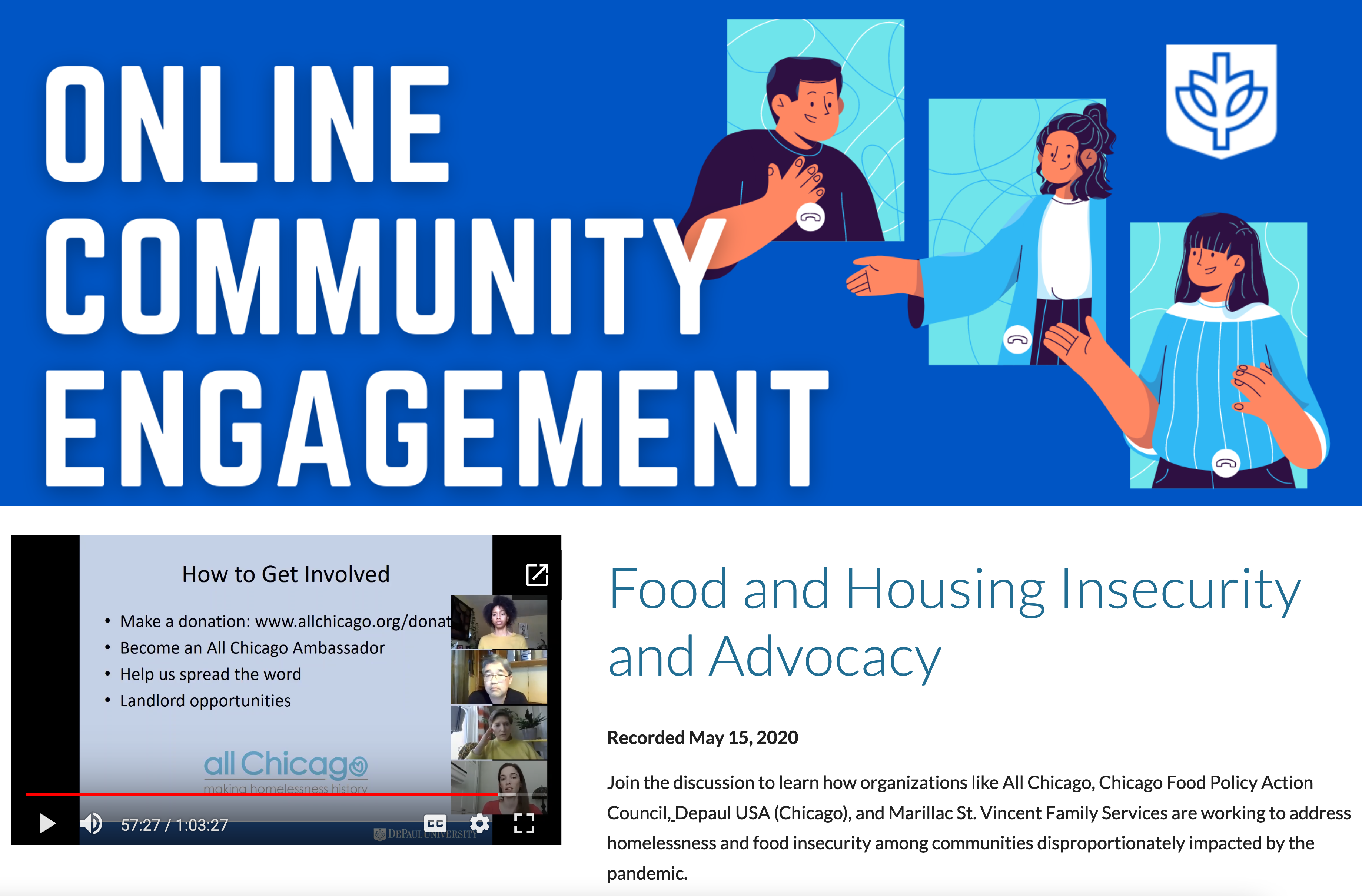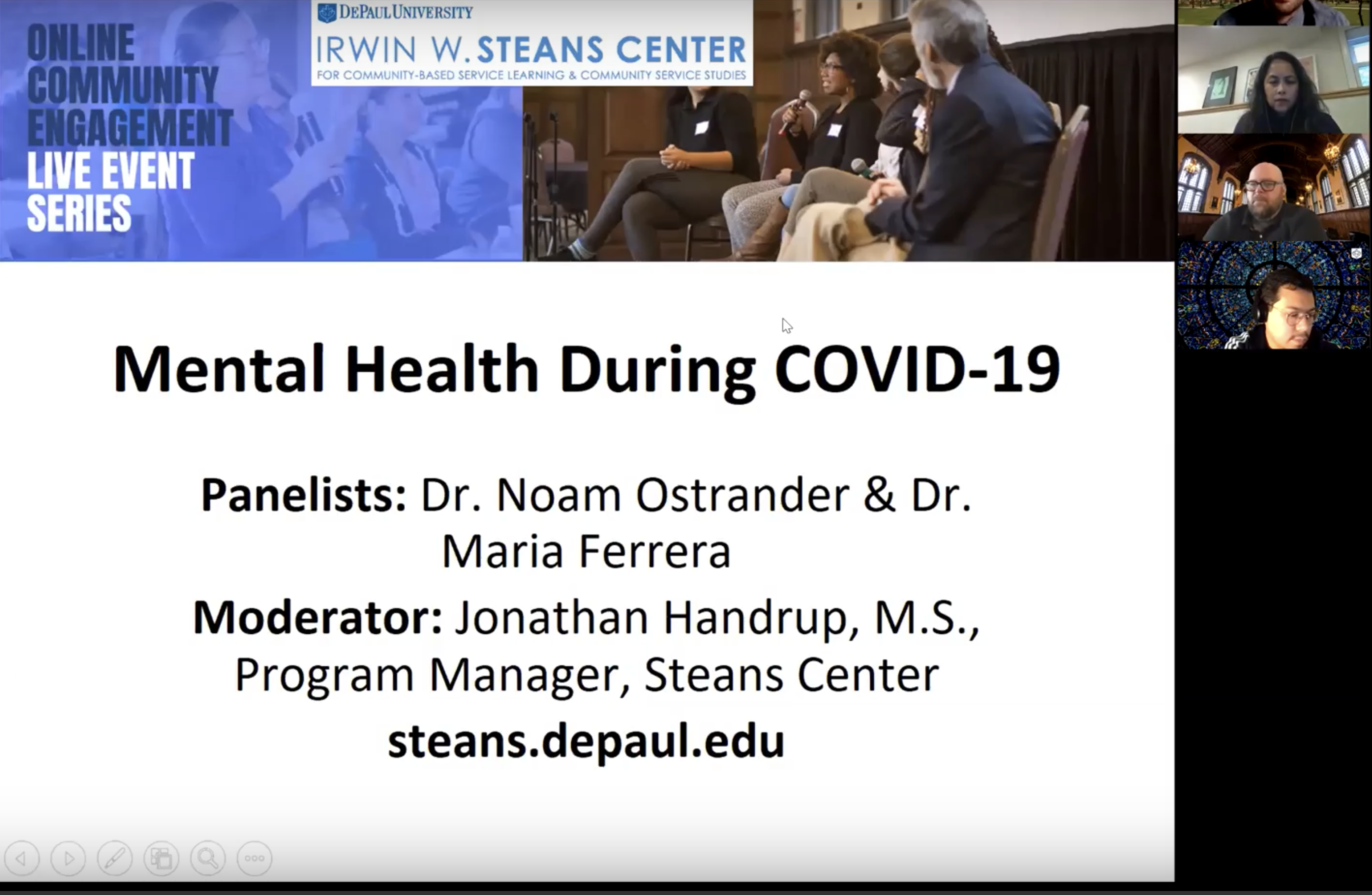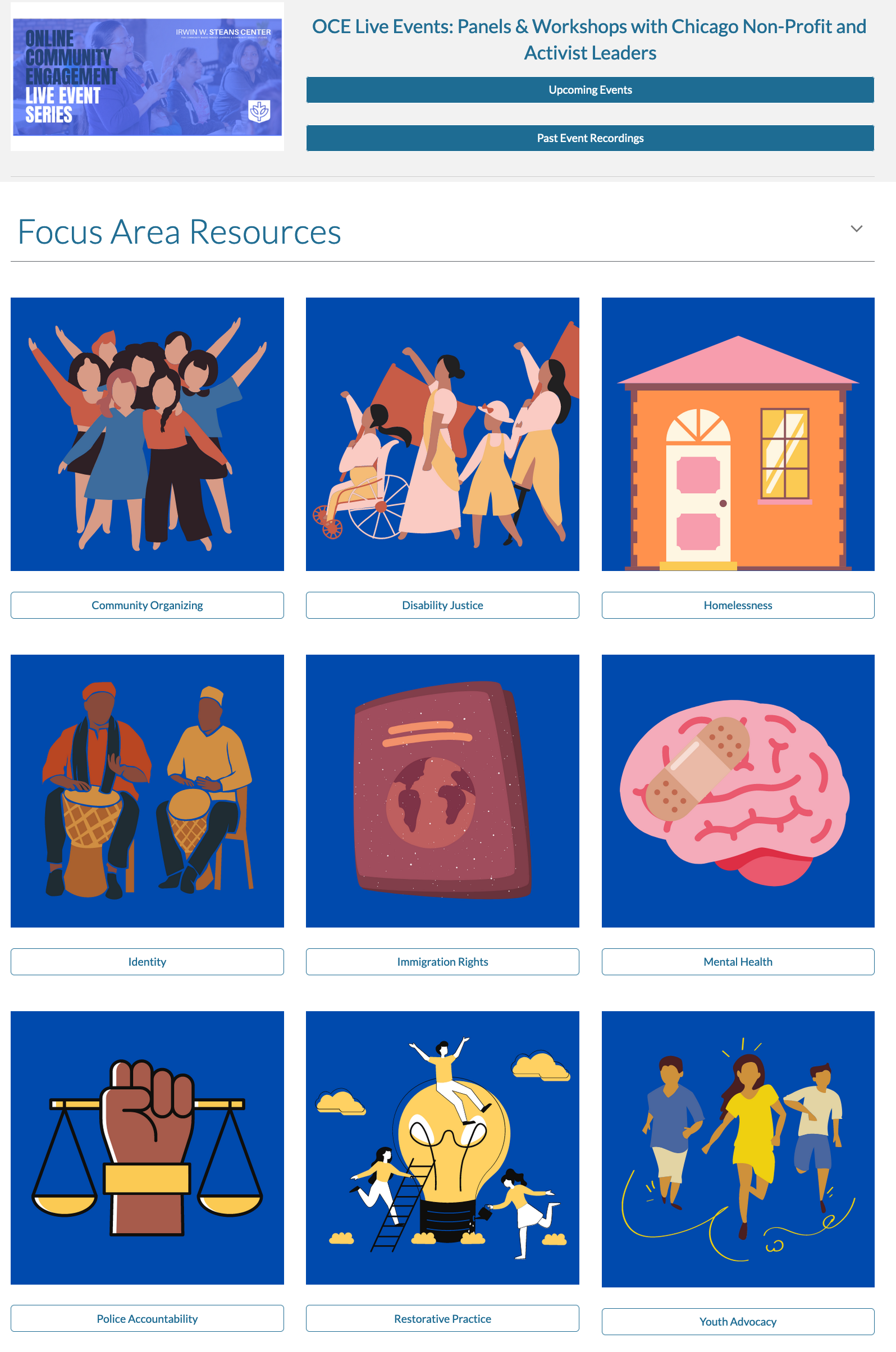
It was Spring 2020 and
the Steans Center faced a challenge unlike anything in its almost twenty years of supporting service learning at DePaul: how to safely engage students with community when they were no longer attending class in person. During a typical spring term, DePaul has approximately 1,000 students engaged with Chicago communities through courses. That Spring, the Center shifted course and staff created Online Community Engagement (OCE), a program faculty employ to encourage dialogue on select topics relevant to curriculum, communities and students. Within a matter of weeks, OCE provided self-directed modules including reading materials and videos for students focused on issues such as mental health, immigration, community organizing, police accountability, and gentrification. The modules culminated with a live online event on Fridays featuring guests from DePaul and Chicago communities.A year later, OCE is not only a valuable teaching and learning strategy during a time of crisis. It has become a new pedagogical tool to be integrated into Steans Center support of service learning as the university reemerges into a post-pandemic world. “The series is very much geared to students who are enrolled in community-based service learning courses as a way to enhance any civic engagement activities," says Jonathan Handrup, a Program Manager on the Academic Service Learning team. “We have found that in this virtual space, we can have experts in the field and faculty sharing information with students – as well as other faculty and community members - on a wide variety of topics." David Pintor, Student Engagement Program Manager with the Academic Service Learning team, says that the online events are a good way to share more perspectives. “With this format, modules can share the perspective of local, statewide, and even national voices on key issues." Issues for Spring Quarter 2021 include Vaccinating our City (in collaboration with the School of Nursing), Podcasts for Change, LGBTQIA + Allyship, Mental Health in 2021, and Prison Abolition.
78 percent of people in the city live in areas where there is a lack of therapists
Emphasis on Mental Health
The popularity of OCE has grown. During summer 2020, more than 90 people attended a module titled “Mental Health Within a Global Pandemic & Civil Uprising." One of the panelists was Dr. Arturo Carillo, Director of Violence Prevention and Health Initiatives for the Brighton Park Neighborhood Council on Chicago's southwest side. He conducts research on the impact of disparities in mental health access on low-income communities and serves residents as a clinical social worker. He presented data on mental health disparities, mapping out where therapists are available and how specific communities were being impacted by lack of access to services. “When we talk about mental health access as an issue, it is really a systemic problem," Carillo says. “Our research has shown that 78 percent of people in the city live in areas where there is a lack of therapists. The areas that are in the highest need of mental health supports are those with the most violence, poverty and all sorts of socioeconomic problems. They also have the least amount of access to mental health services." The problem, he explained to participants, has been exacerbated by the pandemic, noting that “with COVID, there's much more awareness of why people have to take care of mental health."
 Katrina Wagner, Health Promotion Coordinator and Interim Sexual and Relationship Violence Specialist with DePaul's Office of Health Promotion and Wellness, was a panelist on the “Mental Health in 2020" module presented during Fall Quarter 2020. “The module was an easy way for us to get more involved with DePaul's community," says Wagner. “That's the beauty of it – more and more people can be connected in this way." OCE was therefore a way for her office to connect with students about self-care. “We work with students who are pretty young, healthy, and resilient. Health is not always the first thing they want to talk about. We try to provide a support system for students, and participating in this module was a great way to share messages about mental health." During the module, Wagner presented a brief mindfulness meditation activity and then offered important personal health and well-being practices.
Katrina Wagner, Health Promotion Coordinator and Interim Sexual and Relationship Violence Specialist with DePaul's Office of Health Promotion and Wellness, was a panelist on the “Mental Health in 2020" module presented during Fall Quarter 2020. “The module was an easy way for us to get more involved with DePaul's community," says Wagner. “That's the beauty of it – more and more people can be connected in this way." OCE was therefore a way for her office to connect with students about self-care. “We work with students who are pretty young, healthy, and resilient. Health is not always the first thing they want to talk about. We try to provide a support system for students, and participating in this module was a great way to share messages about mental health." During the module, Wagner presented a brief mindfulness meditation activity and then offered important personal health and well-being practices.Course Integration
Online Community Engagement created a new way for faculty, students and community partners to engage with one another through curriculum. “The modules provided a firm basis of understanding on a lot of issues," says Professor Desma Mitchell who teaches Health Promotion for Families and Communities, a course taken by students seeking a degree in the Master's Entry to Nursing Practice (MENP) program. “For my students, it's a place where social justice and health care meet up. It offers a deep dive into issues." Mitchell says her students participated in a wide range of OCE modules including those focused on identity and racial justice, immigration and refugee rights and services, homelessness, and disability justice. The nursing program, she says, takes a multidisciplinary approach and the modules are directly relevant to healthcare. Mitchell adds that OCE emerged as an effective way to engage with others and to learn about topics impacting communities. “We're learning new ways to deliver content and information," she says. “OCE is showing us one way we can do a good job of teaching remotely, providing content, and keeping it interesting and beneficial."
One of the best parts of these modules is that students can meet organizers in the community

For Professor Susan Reed, students in her course “Active Citizens: Making a Difference in the Community, Workplace World" drew upon OCE to learn about prospective partners.
“When the pandemic happened, students asked 'How can we work with communities safely?,' and the Steans Center made a big contribution with these modules," says Reed. One student, she says, wanted to work with an organization that does mentoring through sports, but the organization was closed during the pandemic. “He did some readings and learned about disparities among children in different communities from participating in OCE modules. In particular, he got a lot out of the youth advocacy module which helped him understand that children in different communities are having very different experiences." According to Reed, “This resource is valuable now, and can be valuable when we open back up," She notes, “One of the best parts of these modules is that that students can meet organizers in the community who are working on housing, homelessness, food security, or other issues."Online Community-Engaged Learning
Several students in Read's Active Citizens course used OCE resources while exploring service learning opportunities. For example, Charles Judd, who graduated fall 2020 with a degree in management information systems, was among several students who learned about opportunities through OCE. “This information was clear and easy to use," says Judd who eventually worked on the political election. DePaul student Jamilah El-Saleh also accessed OCE materials as she pursued her degree in business administration through the School of School of Continuing and Professional Studies. She says “The Steans Center was very active and very helpful, and provided us with a lot of links and literature on key topics." Through OCE, El-Saleh eventually engaged in remote service learning activities with the Council of American Islamic Relations (CAIR) in Chicago where she did research related to presidential debates and on Supreme Court cases.

For other students like Bety Camino-Salgado, participating in OCE had a direct impact on how they engaged with Chicago communities during the pandemic. Camino-Salgado, a returning student who is pursuing a degree in photography, participated last fall in modules on gentrification, community organizing, and mental health. In the community organizing module, she says, she learned about asset-based community development (and the ABCD Institute at DePaul). “I learned more about why community-based organizations build on the assets of people who live in communities," she says. Camino-Salgado says her service learning activities for the Active Citizen course involved delivering food for two organizations – Wicker Park-Bucktown Mutual Aid and the Grocery Run Club. She adds that the format of OCE modules, “allows people to be more curious and empathetic to each other. It's great hearing what other people experienced."
Camino-Salgado also explained that the OCE module on gentrification helped her better understand the connection between community organizing , service and action. “This experience helped me feel connected to these communities," she says. In the live session, Professor Jesse Mumm in Latin American and Latino Studies and Critical Ethnic Studies, reflected on the long history of gentrification in Chicago explaining that “the history of Chicago is the history of displacement." Mumm presented maps, a timeline, and other documents to share the complex history of neighborhood change in the city and how it has negatively impacted Latino and African American communities. The modules, Camino-Salgado says, encouraged her to think about the city's history and her own personal journey. “Being involved in the life of a community is not something that starts one day and ends the next," she says. “It requires a lot of reflection." Reflecting on a year of progress building OCE, Ruben Alvarez, Steans Center Associate Director for Academic Service Learning notes "OCE allows the Steans Center to center community, student and faculty voices on the
social justice issues of our times and to hold space virtually for
collective learning, healing and calls to action. My hope is that these
encounters are just
the beginning for continuous dialogue and liberatory actions."